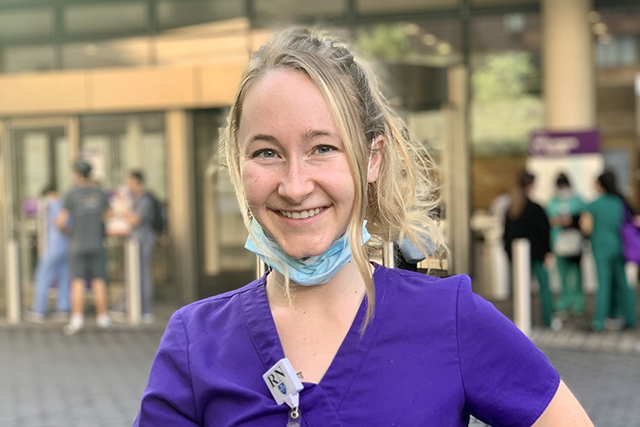
When Lucy Bucket saw New York getting hit hard, she knew where she had to go to help.
By Tom Snee | UI Office of Strategic Communication | 6-17-2020
Lucy Bucket wanted to be a part of history. As a nurse, that meant she knew where she had to be as COVID-19 spread across America this spring.
“When it became clear New York City was overwhelmed with patients, I wanted to go and help,” says Bucket, a 2014 Iowa College of Nursing graduate who now works as a traveling nurse. “I couldn’t put myself in their shoes and not do something to help.”
She moved to New York and on April 13 started an 8-week assignment working in the ventilator care unit at the Langone Medical Center of New York University in Manhattan. An intensive care unit nurse, Bucket tended to patients who survived the worst of the virus and were being weaned off their ventilators. The work was a challenge, she says, not only because of the sheer volume of patients but because of the nature of COVID-19. While some people compared it to a cold or the flu, it was for many far worse.
“It doesn’t act as expected, so the strategies to get patients off the ventilator don’t work well for many of them,” she says. Patients with other diseases who need breathing assistance are often on ventilators for only a few days. But COVID-19 causes so many health problems that patients are on a ventilator for weeks on end, leaving the diaphragm and other abdominal muscles atrophied and weakened to the point where they require extensive therapy for the patient to relearn how to breathe.
“We like to say we have them do lung push-ups,” she says.
Many of the patients also contend with mental health issues and are increasingly agitated as their sedation is reduced, another mysterious symptom of the disease.
“They struggle to get to a mental state where they’re calm enough to do the rehabilitation,” she says.
Obviously, she says nothing she learned in her Iowa nursing classes prepared her to care for people in a hospital overwhelmed with pandemic patients for days on end.
“But they prepare you to help,” she says. “An important thing we learned during this pandemic is that you have to work together and pitch in to help, and that was something we learned in our classes and clinicals over and over again.”
Though most of her patients were in recovery, some still died and that’s always difficult to deal with, she says. But every day at 7 p.m., she tried to make it out to watch the nightly appreciation, a line of firefighters, police officers, and neighbors who line up along the street outside the hospital to clap, cheer, and honk their horns in appreciation for the front-line health care workers’ efforts.
Click here to read the full article by UI’s Office of Strategic Communication
# # #